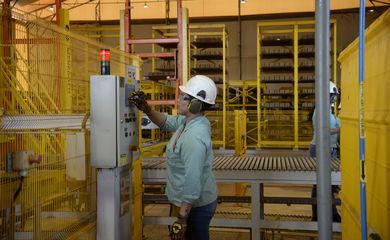Share of wages in Brazil's GDP fell by 12% in five years

The share of workers' salaries in Brazil's Gross Domestic Product (GDP)—measure of the total value of all goods and services produced in the country—decreased by 12.9 percent over five years, reaching its lowest level in 16 years. This percentage has been declining since 2016, when it peaked at 35.5 percent of GDP. In 2021, wages accounted for 31 percent of GDP.

According to data released by the government´s statistic agency IBGE, during the same period, companies' gross operating surplus, from which profits are derived, increased its share of GDP from 32.3 percent to 37.5 percent, representing a 16 percent growth between 2016 and 2021.
Commenting on the data, IBGE head Márcio Pochmann argued that they indicate a reversal of the upward trend in the share of wages in GDP observed between 2004 and 2016.
"The slow and difficult progress made over 12 years to positively change the weight of labor income in GDP was quickly and abruptly dismantled in the last years of neoliberal regression. This has once again placed Brazil among countries with low wages, precarious jobs, and large numbers of marginalized individuals with no prospects," he commented.
Between 2004 and 2016, the share of wages in GDP increased by 16.3 percent, from 30.6 percent to 35.67 percent. Conversely, during this period, the share of companies' gross operating surplus decreased by 6.6 percent, from 34.6 percent to 32.3 percent of GDP.
Recession and pandemic
The decline in the share of salaries in GDP is a result of the economic recession that began in 2015 and the pandemic, and has also been influenced by labor reform, according to Professor Pedro Paulo Zahuth Bastos from the Institute of Economics at the State University of Campinas (Unicamp).
Bastos argues that with rising unemployment during this period, workers lost bargaining power to negotiate wage increases to offset inflation. As the real value of wages decreased, companies' surpluses increased.
"When there is a large number of job seekers, workers lack the bargaining power to raise nominal wages to compensate for the loss of real income due to inflation. This leads to an increase in the share of companies' gross operating surplus because, in relative terms, real wages have declined," he explained.
The Unicamp economist also believes that labor reform has influenced this outcome by reducing workers' bargaining power. He added that the reduction in wages in GDP was much greater during the pandemic than in the recession of previous years. "The impact of the pandemic is even greater because it increases unemployment, reduces the total labor force, and also real income," he added.
Inequality
The indicator of the share of wages in GDP is crucial for measuring the level of social inequality in a country, said Pedro Paulo Zahuth Bastos. In addition to increasing inequality, the economist explains that reducing the power of wages is negative for the national economy.
"The more income from GDP that goes to workers, the higher the consumption, and consequently, the larger Brazil's domestic market becomes. A larger domestic market creates a greater incentive for capitalist profits to be invested in increasing production," he said.
According to Bastos, the increase in companies' gross surplus will not necessarily be reinvested in activities that generate employment. "If they make more profit but there is no market, they will simply buy financial assets [such as government bonds]," he said.
"[The reduction of wages in GDP] is detrimental not only from the standpoint of society, public health, social welfare, and social peace but also for economic growth," he concluded.



Dê sua opinião sobre a qualidade do conteúdo que você acessou.
Escolha sua manifestação em apenas um clique.
Você será direcionado(a) para o sistema Fala.BR, mas é com a EBC que estará dialogando. O Fala.BR é uma plataforma de comunicação da sociedade com a administração pública, por meio das Ouvidorias.
Sua opinião ajuda a EBC a melhorar os serviços e conteúdos ofertados ao cidadão. Por isso, não se esqueça de incluir na sua mensagem o link do conteúdo alvo de sua manifestação.
Clique aqui para mais informações sobre a Ouvidoria da EBC.









